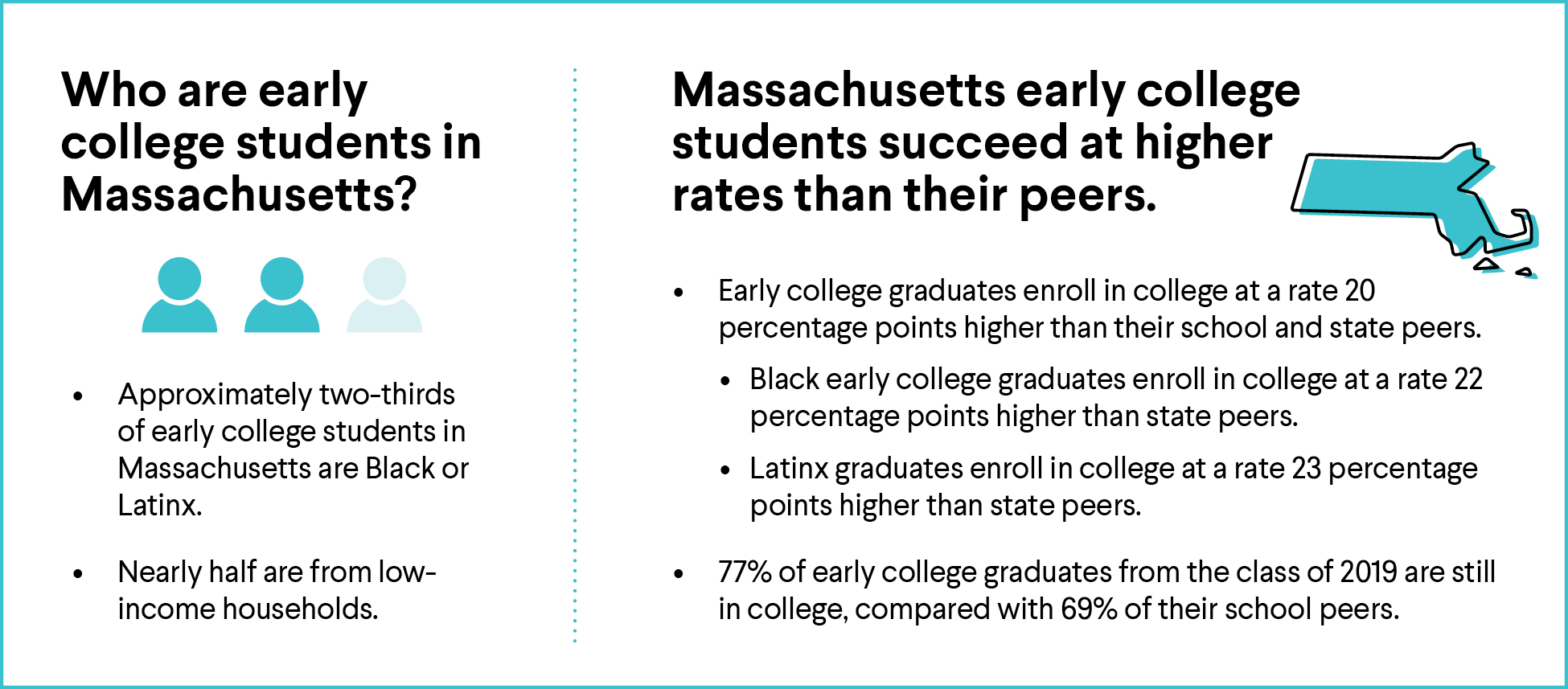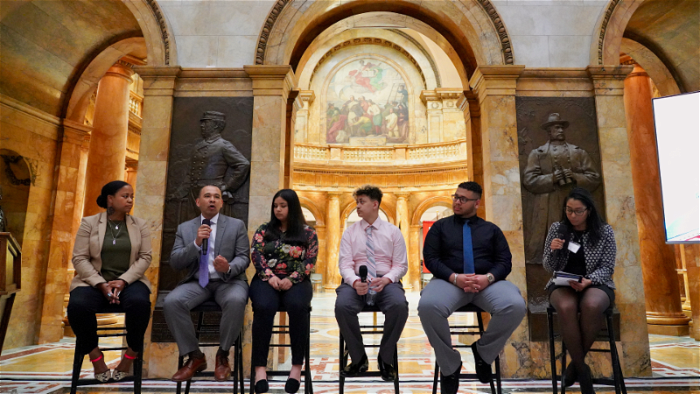
Massachusetts Early College
April 13, 2021
At a Glance
Massachusetts early college high school programs are laying the groundwork for young people across the state to successfully transition from high school to college and careers.
The Promise of Early College
Early college high school combines rigorous college-level coursework with a high level of support and encouragement from teachers, counselors, and mentors.
Through early college programs, students in grades 9 to 12 earn at least 12 transferable college credits—and up to an associate’s degree—by the time they graduate from high school.
Early college programs are uniquely positioned to create equitable pathways that truly support all young people in college and careers.
Early college programs accelerate college and career readiness for students from low-income households, English learners, and those whose prior academic experiences have not prepared them well for a collegiate path. They also help address financial concerns because students can earn college credits for free. And those benefits multiply: By reducing both the cost of a postsecondary education and the time it takes to earn a degree or credential, early college programs ease students’ pathways to well-paid jobs in careers that offer opportunities for economic advancement.
I decided to join MetroWest Scholars Early Start program because I believe it is a good opportunity and that it would most likely help me in the future. One thing that I have achieved through the program is to obtain college credits and learn new things that will help me in the future.
Ninth grader, Framingham High School Early College
Massachusetts launched its early college high school initiative in 2017 to provide students, especially first-generation college-goers, a pathway to college and career success.
The movement has rapidly expanded to 38 high schools in partnership with 20 colleges and universities in the past four years, providing young people across the state with increased postsecondary access. During the 2020-21 school year, nearly 3,500 early college students are expected to earn a total of 24,000 college credits, saving their families $5.2 million in tuition and fees.

Initially, the Massachusetts Early College Initiative set a goal of enrolling at least 16,000 students. Encouraged by positive early results, state leaders are advocating for a more ambitious goal (45,000 students) that will markedly reduce gaps in degree completion and prepare a more diverse talent pipeline for the many opportunities in the state.
The Learning Community
In 2018, the Richard and Susan Smith Family Foundation awarded JFF funding to lead a learning community to support six of the state’s 23 early college partnerships. The members of this learning community collaborate to expand and strengthen both individual programs and the early college movement across Massachusetts and the country.
In Partnership With


An Education Powerhouse: Massachusetts Early College High School Series
Learn about the emerging work and impact of the Massachusetts Early College Initiative.
Related Content

Early College High School Is Changing Students’ Lives and Futures in Lawrence, Massachusetts
Hundreds of students at Lawrence High School in Massachusetts are getting a head start on their college careers, thanks to an innovative model that helps students prepare for and earn college degrees while in high…

How Do We Know That Massachusetts Early Colleges Are Doing Well?: Using Data to Track Outcomes
The purpose of this brief is to provide school-level examples of how early college practitioners are collecting and using data to improve their practices. Examples three and four are school-level data from two early college…

Digital Resilience in the American Workforce: Findings from a National Landscape Scan on Adult Digital Literacy Instruction
In the first year of the Digital Resilience in the American Workforce (DRAW) initiative, Jobs for the Future (JFF), World Education, and Safal Partners launched a landscape scan to better understand what training resources and…

Strategies to Support Young Men of Color in Early College High Schools
Early college high schools are powerful instruments for success for students, especially young men of color. This report outlines strategies to remove systemic barriers to their engagement and provides examples of successful and emerging practices…

Building a Foundation for Early College in Grades 9 and 10
Encouraged by strong initial results from early college high school programs, Massachusetts aims to further expand them throughout the state. This report outlines strategies for reaching more students: expanding access to students in grades 9…

At Last, Early College Makes the Grade in Massachusetts
It took nearly 20 years, but early college high schools have stepped into the limelight in the Bay State.

Early College
Earning college credit in high school is a proven way for low-income students to get a jump on a college degree. JFF leads expansion of this national model. Earning college credit in high school is…
